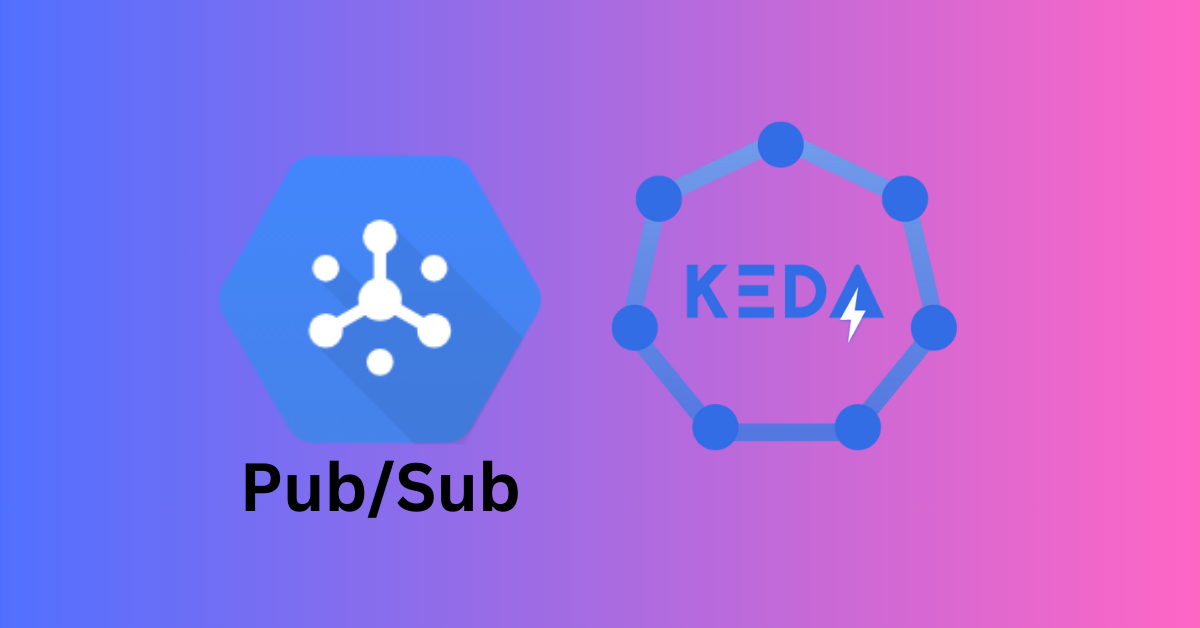Table of Contents
Keda Pub/Sub Scaler was an unnecessary challenge I had to face over the course of 3 days. If you were to cross reference these 3 sources:
- https://cloud.google.com/kubernetes-engine/docs/tutorials/scale-to-zero-using-keda#setup-env
- https://keda.sh/docs/2.10/scalers/gcp-pub-sub/
- https://keda.sh/docs/2.14/authentication-providers/gcp-workload-identity/
You can come to a reasonable idea of what you need to do. As long as you read it thoroughly…
Or you can see a working example here 😀
TLDR;
Go to the full example
Assumptions
- Workload Identity is turned on for you cluster
- Your node pool has “GKE Metadata Server” enabled
- Your GCP user has the permissions to create a workload identity for a Kubernetes Service Account
- You’re using helm to install keda
Getting Started
To get Keda working you first need to get Custom Metrics Stackdriver Adapter working.
Please see my article on GCP Horizontal Pod Autoscaling with Pub/Sub to learn how to set that up.
Configuring Keda
After getting the custom metrics stackdriver adapter working now its time to install keda
helm install --repo https://kedacore.github.io/charts --version 2.16.0 keda keda -n kedaCreate a bash script to add a policy binding to the keda-operator KSA and call the script add-policy.sh.
PROJECT_ID=$(gcloud projects list --filter="$(gcloud config get-value project)" --format="value(PROJECT_ID)")
PROJECT_NUMBER=$(gcloud projects list --filter="$(gcloud config get-value project)" --format="value(PROJECT_NUMBER)")
KEDA_NAMESPACE=keda
gcloud projects add-iam-policy-binding projects/$PROJECT_ID \
--role=roles/monitoring.viewer \
--member=principal://iam.googleapis.com/projects/$PROJECT_NUMBER/locations/global/workloadIdentityPools/$PROJECT_ID.svc.id.goog/subject/ns/$KEDA_NAMESPACE/sa/keda-operator \
--condition=None
echo "Added workload identity to keda-operator"That is all you need to do to enable Keda Pub/Sub Scaler. Continue on if you want a full example
Full Example
This script will
- install keda via helm
- add policy binding for the keda-operator and pubsub-sa KSA’s
- create a topic/subscription
- Deploys an app that reads from the pub/sub subscription
- Creates Keda TriggerAuthentication and ScaledObject objects
PROJECT_ID=$(gcloud projects list --filter="$(gcloud config get-value project)" --format="value(PROJECT_ID)")
SERVICE_ACCOUNT_NAME=custom-metrics-stackdriver
PROJECT_NUMBER=$(gcloud projects list --filter="$(gcloud config get-value project)" --format="value(PROJECT_NUMBER)")
KEDA_NAMESPACE=keda
APP_NAMESPACE=default
PUBSUB_TOPIC=echo
PUBSUB_SUBSCRIPTION=echo-read
YAML_FILE_NAME=test-app.yaml
create(){
helm install keda kedacore/keda -n keda
sleep 3
gcloud projects add-iam-policy-binding projects/$PROJECT_ID \
--role=roles/monitoring.viewer \
--member=principal://iam.googleapis.com/projects/$PROJECT_NUMBER/locations/global/workloadIdentityPools/$PROJECT_ID.svc.id.goog/subject/ns/$KEDA_NAMESPACE/sa/keda-operator \
--condition=None
echo "Added workload identity to keda-operator"
gcloud pubsub topics create $PUBSUB_TOPIC
sleep 5
echo "Created $PUBSUB_TOPIC Topic"
gcloud pubsub subscriptions create $PUBSUB_SUBSCRIPTION --topic=$PUBSUB_TOPIC
echo "Created Subscription $PUBSUB_SUBSCRIPTION to Topic $PUBSUB_TOPIC"
gcloud projects add-iam-policy-binding projects/$PROJECT_ID \
--role=roles/pubsub.subscriber \
--member=principal://iam.googleapis.com/projects/$PROJECT_NUMBER/locations/global/workloadIdentityPools/$PROJECT_ID.svc.id.goog/subject/ns/$APP_NAMESPACE/sa/pubsub-sa
echo "Added workload identity to to pubsub-sa"
cat > $YAML_FILE_NAME << EOL
apiVersion: v1
kind: ServiceAccount
metadata:
name: pubsub-sa
---
# [START gke_deployment_pubsub_with_workflow_identity_deployment_pubsub]
# [START container_pubsub_workload_identity_deployment]
apiVersion: apps/v1
kind: Deployment
metadata:
name: pubsub
spec:
selector:
matchLabels:
app: pubsub
template:
metadata:
labels:
app: pubsub
spec:
serviceAccountName: pubsub-sa
containers:
- name: subscriber
image: us-docker.pkg.dev/google-samples/containers/gke/pubsub-sample:v2
---
apiVersion: keda.sh/v1alpha1
kind: TriggerAuthentication
metadata:
name: keda-trigger-auth-gcp-credentials
spec:
podIdentity:
provider: gcp
---
apiVersion: keda.sh/v1alpha1
kind: ScaledObject
metadata:
name: pubsub-scaledobject
spec:
scaleTargetRef:
name: pubsub #Deployment
minReplicaCount: 1
maxReplicaCount: 2
triggers:
- type: gcp-pubsub
authenticationRef:
name: keda-trigger-auth-gcp-credentials
metadata:
subscriptionName: "echo-read" # Required
value: "5"
activationValue: "5"
# credentialsFromEnv: GOOGLE_APPLICATION_CREDENTIALS_JSON
# [END container_pubsub_workload_identity_deployment]
# [END gke_deployment_pubsub_with_workflow_identity_deployment_pubsub]
EOL
kubectl apply -f $YAML_FILE_NAME -n $APP_NAMESPACE
echo "Deployed test application"
}
delete(){
kubectl delete -f $YAML_FILE_NAME -n $APP_NAMESPACE
gcloud projects remove-iam-policy-binding projects/$PROJECT_ID \
--role=roles/pubsub.subscriber \
--member=principal://iam.googleapis.com/projects/$PROJECT_NUMBER/locations/global/workloadIdentityPools/$PROJECT_ID.svc.id.goog/subject/ns/$APP_NAMESPACE/sa/pubsub-sa \
--condition=None
gcloud pubsub subscriptions delete $PUBSUB_SUBSCRIPTION
gcloud pubsub topics delete $PUBSUB_TOPIC
gcloud projects remove-iam-policy-binding projects/$PROJECT_ID \
--role=roles/monitoring.viewer \
--member=principal://iam.googleapis.com/projects/$PROJECT_NUMBER/locations/global/workloadIdentityPools/$PROJECT_ID.svc.id.goog/subject/ns/$KEDA_NAMESPACE/sa/keda-operator \
--condition=None
helm uninstall keda -n keda
}
createIn another window send messages to the topic
$ for i in {1..200}; do gcloud pubsub topics publish echo --message="Autoscaling #${i}"; doneIts going to take a few minutes for the scaling to occur.
Watch as the pod count goes up. Eventually you’ll see the targets start to go up
$ watch kubectl get hpa -n default
NAME REFERENCE TARGETS MINPODS MAXPODS REPLICAS AGE
keda-hpa-pubsub-scaledobject Deployment/pubsub 2/5 (avg) 1 2 2 10m
TroubleShooting
- You see the dreaded
<unkown>/5error.- This can happen for a variety of reasons. Its best to check the output of all the commands and make sure they all work. If any of them failed then the hpa setup will fail.
